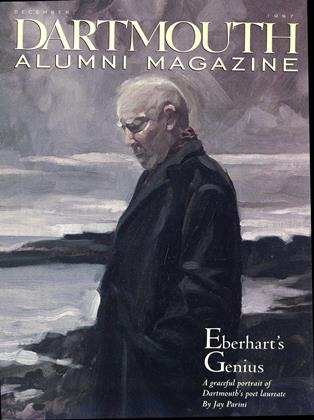Even at Dartmouth, some professors are separate and unecfual.
THERE'S AN OLD ARMY JOKE, often told on bases where they train recruits, that purports to teach brand-new soldiers how to respond to their military environment. "If it moves, salute it," the instruction goes. "If it doesn't move, paint it."
That's wild exaggeration, of course— the favorite form of American humor. Very few recruits actually do salute each passing corporal or windblown leaf. But there's a comparable rule for Dartmouth students which is perfectly serious. The rule can be expressed thus: If it comes into a classroom, goes to the front, and starts talking, call it a professor.
Two times out of three, this is a reasonable and even an accurate thing to do. Two-thirds of the faculty are professors, or at least hope to be some day. In rising order of importance, the young hopefuls are called instructors, assistant professors, and associate professors. Viewed collectively, they are known in college jargon as the tenure-track faculty. If you were a purist, you could say that the instructors, at least, have no business being called "professor," and yet it does fit. They are profs in embryo, and they are just as much on track as the most senior holder of an endowed chair.
But the other third of Dartmouth's faculty are not on track. Instead they travel a much dustier road that runs parallel to the gleaming rails. Some we call adjuncts, some we call visitors (I know of one case where a teacher has been visiting for 13 years, which is exactly how long Franklin D. Roosevelt visited the White House). Finally, quite a lot are called lecturers (on one-year appointments) and senior lecturers (on two-year appointments). These appointments can be and usually are renewed.
It's the two kinds of lecturer I want to talk about here—both, of course, called "professor" by the students, though they will never be professors. As at all colleges, they are separate and unequal. For example, the full teaching load for a tenuretracker at Dartmouth is four courses a year. But the full teaching load for a lecturer or senior lecturer is six courses.
important work, and a lot of it.
But conspicuously invalid, in my opinion, is the argument that the tenure-trackers need time for research and for scholarly writing, while lecturers do not. Think a minute. Why does a professor need to do research and write books? Why is he or she almost certain to be denied tenure if no research is forthcoming?
The official answer is very clear. Many reasons come into play, including pure advancement of knowledge, and also academic prestige. But ultimately it's for the sake of the students. The teacher who is not still learning, doing field work, running experiments is intellectually moribund, and there- fore a less effective teacher. I believe this to be true.
But once you make that case for the regulars, I don't see how you can avoid making it for the lecturers. They do a lot of teaching at Dartmouth—about half the sections of freshman English, for example. Do we want them moribund? Surely not. And if we point out that they can stay intellectually alive on their own time, then the question arises: How come the regular faculty can't? I have yet to hear a satisfactory answer.
Mind you, Dartmouth treats its adjuncts and lecturers far better than most colleges do. I have a friend in the slave ranks at NYU, where he has been getting $1,500 a course on one-semester appointments. At the University of Illinois his little paycheck would be about $2,500 a course. Our lecturers get between $5,000 and $9,000 per.
Better yet, that very distinguished former dean of the faculty Jim Wright did recognize that lecturers benefit from doing re search. For the past three years he awarded a $5,000 research grant to an especially gifted senior lecturer. Past winners include two outstanding members of the English department: Laurence Davies and Terry Osborne. The current winner is Joan Campbell, senior lecturer in the German department. She's a woman with such interesting ideas that she'll surely be a subject in one of these columns, sometime soon.
But good as we are, we could be doing better. Look at Williams. They have a dusty non-tenure track, too. But some stretches they have paved. With five-year contracts for senior lecturers, for example. They even have a senior lecturer with an endowed chair. The poet Louise Gluck has just become the Preston S. Parish '41 Third Century Senior Lecturer in English. Now that's class.
 View Full Issue
View Full Issue
More From This Issue
-
 Feature
FeatureEarly X-rays, Missing Skulls and Frozen Pizza
December 1997 -
 Cover Story
Cover StoryThe Full Mind of Richard Eberhart
December 1997 By Jay Parini -
 Feature
FeatureNathan's Body Shop
December 1997 -
 Feature
FeatureCathedral in THE PINES
December 1997 By Castle Freeman Jr. -
 Feature
FeatureA Musical Post-Mortem
December 1997 -
 Feature
FeatureAn Uulikely Medical School
December 1997
Noel Perrin
-
 Article
ArticleThe Prize Nobody Wins
JUNE 1978 By NOEL PERRIN -
 Feature
FeatureFathoming the Practical Universe Dan and Whit's
April 1995 By Noel Perrin -
 Article
ArticleO Wisest Vox, All-Knowing Vox, Silent Vox
DECEMBER 1996 By Noel Perrin -
 Article
ArticleThe Difference With Oberlin
APRIL 1998 By Noel Perrin -
 Article
ArticleThe Financing Game
MAY 1999 By Noel Perrin -
 CURMUDGEON
CURMUDGEONSkating on Thin Ice
MARCH 2000 By Noel Perrin







